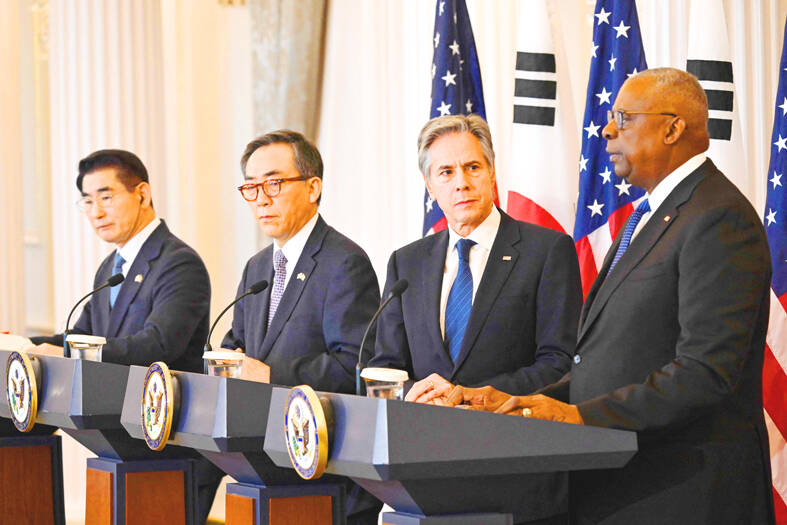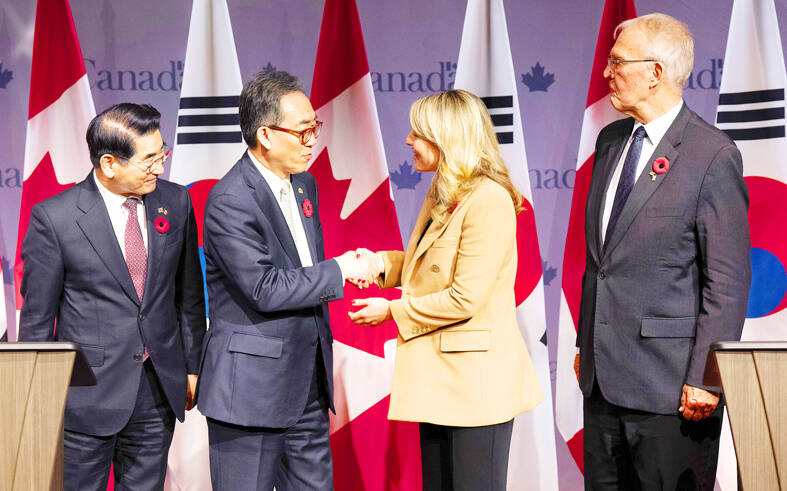The US and South Korea have expressed concern over China’s recent “provocative actions,” as it had conducted large-scale military exercises around Taiwan, raising tensions across the Taiwan Strait.
In a joint statement released by the US and South Korean governments after their “2+2 ministerial meeting,” both sides emphasized the importance of stability across the Strait.
US Secretary of State Antony Blinken and US Secretary of Defense Lloyd Austin on Thursday hosted a joint foreign and defense ministerial meeting with South Korean Minister of Foreign Affairs Cho Tae-yul and South Korean Minister of National Defense Kim Yong-hyun.

Photo: AFP
The officials “expressed concern over provocative actions, particularly the recent military drills around Taiwan that escalate tension, and concurred that no further actions should be taken that could undermine peace and stability across the Taiwan Strait,” the statement said.
“Both sides emphasized the importance of maintaining peace and stability across the Taiwan Strait as an indispensable element of security and prosperity for the international community,” it added.
Washington and Seoul remained unchanged in their basic position about Taiwan, such as their wish for “the peaceful resolution of cross-strait issues,” the statement said.

Photo: AP
On Oct. 14, shortly after Double Ten National Day, the Chinese People’s Liberation Army (PLA) launched its “Joint Sword-2024B” military drills, sending its army, navy, air force and rocket force into the Taiwan Strait and to areas to the north, south and east of Taiwan, as a “stern warning to the separatist acts of Taiwanese independence forces.”
The drills came four days after President William Lai (賴清德) in a Double Ten National Day address said that Taiwan and China are not subordinate to each other.
It was the second large-scale military exercise since Lai took office on May 20. The PLA on May 23 had staged the “Joint Sword-2024A” military drills around Taiwan.
The 2+2 talks are bilateral meetings the US holds with key allies in the region, such as South Korea, Japan and Australia.
Washington and Seoul demonstrated their strong opposition to any unilateral attempts to change the “status quo” in the Indo-Pacific region and recognized the importance of opposing unlawful maritime claims in the South China Sea, the statement said.
The US and South Korea also underscored the importance of maritime safety and security, upholding international law as reflected in the UN Convention on the Law of the Sea, such as freedom of navigation and overflight, and other lawful uses of the sea, and the peaceful resolution of disputes as essential for regional stability and prosperity, it said.
The officials also condemned the “deepening military cooperation” between North Korea and Russia, including continued unlawful arms transfers and the deployment of North Korean troops to Russia to help fight the war in Ukraine.
On Friday, Canada and South Korea held a foreign and defense ministerial meeting and in a joint statement also affirmed their “commitment to a free and open Indo-Pacific, based on the rule of law and the peaceful resolution of disputes.”
“We continue to advocate for peace and stability throughout the Indo-Pacific region,” it said.
“We oppose any unilateral attempts to change the status quo in the Indo-Pacific,” it added. “We reaffirm that maintaining peace and stability across the Taiwan Strait is indispensable to international security and prosperity.”

AGING: As of last month, people aged 65 or older accounted for 20.06 percent of the total population and the number of couples who got married fell by 18,685 from 2024 Taiwan has surpassed South Korea as the country least willing to have children, with an annual crude birthrate of 4.62 per 1,000 people, Ministry of the Interior data showed yesterday. The nation was previously ranked the second-lowest country in terms of total fertility rate, or the average number of children a woman has in her lifetime. However, South Korea’s fertility rate began to recover from 2023, with total fertility rate rising from 0.72 and estimated to reach 0.82 to 0.85 by last year, and the crude birthrate projected at 6.7 per 1,000 people. Japan’s crude birthrate was projected to fall below six,

US President Donald Trump in an interview with the New York Times published on Thursday said that “it’s up to” Chinese President Xi Jinping (習近平) what China does on Taiwan, but that he would be “very unhappy” with a change in the “status quo.” “He [Xi] considers it to be a part of China, and that’s up to him what he’s going to be doing, but I’ve expressed to him that I would be very unhappy if he did that, and I don’t think he’ll do that. I hope he doesn’t do that,” Trump said. Trump made the comments in the context

SELF-DEFENSE: Tokyo has accelerated its spending goal and its defense minister said the nation needs to discuss whether it should develop nuclear-powered submarines China is ramping up objections to what it sees as Japan’s desire to acquire nuclear weapons, despite Tokyo’s longstanding renunciation of such arms, deepening another fissure in the two neighbors’ increasingly tense ties. In what appears to be a concerted effort, China’s foreign and defense ministries issued statements on Thursday condemning alleged remilitarism efforts by Tokyo. The remarks came as two of the country’s top think tanks jointly issued a 29-page report framing actions by “right-wing forces” in Japan as posing a “serious threat” to world peace. While that report did not define “right-wing forces,” the Chinese Ministry of Foreign Affairs was

PREPAREDNESS: Given the difficulty of importing ammunition during wartime, the Ministry of National Defense said it would prioritize ‘coproduction’ partnerships A newly formed unit of the Marine Corps tasked with land-based security operations has recently replaced its aging, domestically produced rifles with more advanced, US-made M4A1 rifles, a source said yesterday. The unnamed source familiar with the matter said the First Security Battalion of the Marine Corps’ Air Defense and Base Guard Group has replaced its older T65K2 rifles, which have been in service since the late 1980s, with the newly received M4A1s. The source did not say exactly when the upgrade took place or how many M4A1s were issued to the battalion. The confirmation came after Chinese-language media reported